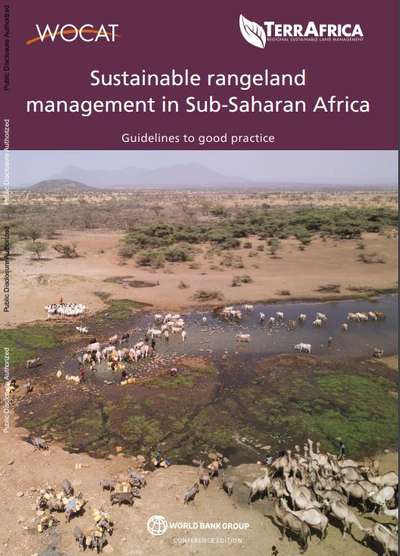Sustainable rangeland management in Sub-Saharan Africa : Guidelines to good practice
Liniger, Hanspeter ; Rima Mekdaschi Studer

408 pp. : ill.
Conference Edition
[Gift of Dr Abram Bicksler Jan 24, 2023]
Part 1 Chapter 1: Setting the scene and aim of these guidelines 11
Chapter 2: Sub-Saharan Africa rangelands defined 15 2.1 What and where are rangelands? 15 2.2 Why are rangelands in SSA important? 33 2.3 Changing rangeland concepts over the last century 35
Chapter 3. Rangeland use systems and their management 37 3.1. Rangeland use systems classified 37 3.2. Sustainable rangeland management classified 53
Chapter 4: Sustainable rangeland management – drivers, impacts and continuous change 57 4.1. Key drivers and shocks influencing SRM 57 4.2. SRM practices implemented 69 4.3 Impacts of SRM on health of land resources 78 4.4 Impacts of SRM on ecosystem services and human well-being 90 4.5 Feedback of Ecosystem Services from SRM on Drivvers 104
Chapter 5: The way forward – strengthening sustainable rangeland management in Sub-Saharan Africa 107 5.1 SRM technologies for outscaling 108 5.2 SRM approaches towards upscaling SRM technologies 111 5.3 Awareness, knowledge and capacities 113 5.4 The future of sustainable rangeland management 115
Part 2 Enabled mobility (TG1) 125 Controlled grazing (TG2) 155 Range improvement (TG3) 181 Supplementary Feeding (TG4) 243 Infrastructure improvement (TG5) 261 Community based natural resource management (AG1) 277 Land & water use planning (AG2) 295 Marketing & alternative income (AG3) 335 Wildlife & nature tourism (AG4)
Publication Details
- Published: 2019
- Publisher: World Bank Group (WBG), Washington DC, USA and Centre for Development and Environment (CDE), University of Bern, Switzerland
- Dewey Decimal: 630.96
- ECHO Library: 630.96 WOR